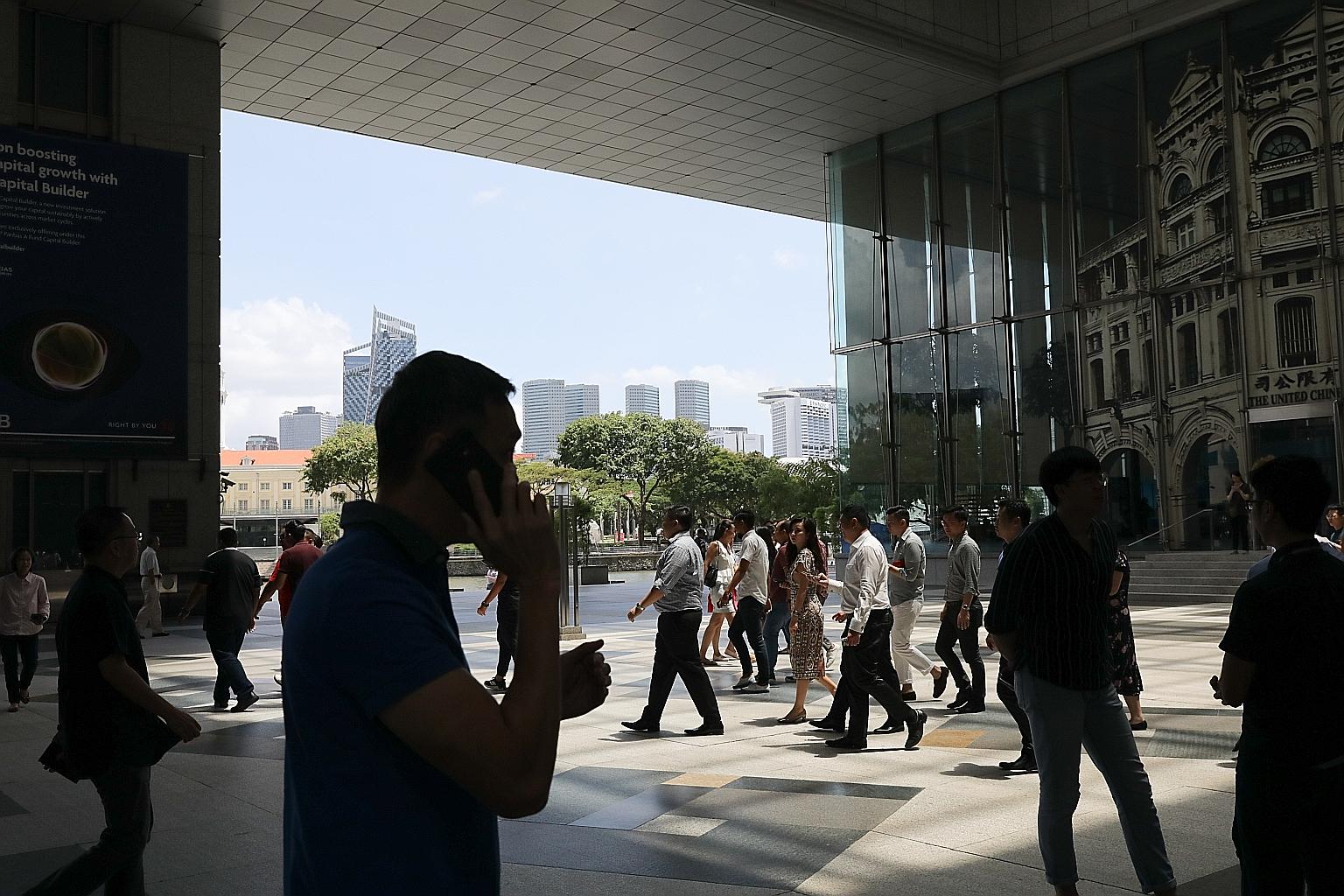Coronavirus: Weathering the storm
S'pore could see worst annual decline in growth
GDP may shrink by 1% to 4% amid global virus curbs and fall in domestic consumption: MTI
Sign up now: Get ST's newsletters delivered to your inbox

It is the first time since the third quarter of 1998 that all three key sectors of the economy have contracted on a year-on-year basis, including the services-producing industries which shrank by 3.1 per cent.
ST FILE PHOTO
Ovais Subhani Senior Correspondent, Ovais Subhani
Follow topic:
Singapore's economy will likely experience its worst annual decline ever as an escalating global pandemic chokes the life out of economic activity both at home and abroad.
The nation's gross domestic product (GDP) may shrink by 1 to 4 per cent this year amid mounting border controls and lockdowns around the world to contain the coronavirus pandemic, and a sharp pullback in domestic consumption, said the Ministry of Trade and Industry (MTI) yesterday.
If contraction hits the forecast range midpoint at 2.5 per cent, it will be the worst since the Asian financial crisis in 1998, when annual GDP growth shrank by 2.2 per cent.
If the more negative end of the estimate is reached, it will be comparable to the 3.2 per cent contraction in 1964.
This is the second time GDP growth has been downgraded in over a month. The last estimate of minus 0.5 per cent to 1.5 per cent was released just before Budget 2020 last month.
Given the rapid deterioration of the economic outlook, Singapore has announced a supplementary budget of about $48 billion. This is in addition to the $6.4 billion stimulus package unveiled last month and raises the total to around $55 billion, or 11 per cent of GDP.
The size of the stimulus in terms of GDP makes it bigger than the US$2 trillion (S$2.9 trillion) package passed by the US Congress, which comes to about 10 per cent of the United States' GDP.
Referring to the MTI downgrade, Deputy Prime Minister and Finance Minister Heng Swee Keat said the coronavirus outbreak has impacted broad swathes of the economy, with some more affected than others.
"We are facing an unprecedented crisis of a highly complex nature.
"In economic terms alone, this will likely be the worst economic contraction since independence," he said, while presenting the supplementary budget in Parliament.
The growth downgrade by MTI was triggered by advance GDP growth estimates that showed the economy contracting by 2.2 per cent year on year in the first quarter - the worst year-on-year contraction since the first quarter of 2009.
It is also the first time since the third quarter of 1998 that all three key sectors of the economy have contracted on a year-on-year basis.
The manufacturing sector contracted by 0.5 per cent, construction shrank by 4.3 per cent and services-producing industries - the sector accounting for about two-thirds of GDP and employment - contracted by 3.1 per cent.
MTI cited the spillover effects of global supply chain disruptions, the sharp decline in tourism and disruptions to domestic demand from social distancing measures as the main reasons for first-quarter growth decline across the three sectors.
Since advance estimates are computed largely from data in the first two months of the quarter, the full-quarter growth may have to be revised even lower in the Economic Survey of Singapore due in May.
OCBC Bank's head of treasury research and strategy Selena Ling said: "March was (the month of) the second wave of imported infections, tightened social distancing restrictions and the more recent measures to close entertainment venues and tuition and enrichment centres, which could take another toll on business and consumer sentiments."
A labour crunch after Malaysia imposed a movement control order on its borders with Singapore may also contribute to the contraction.
Governments across the world are forking out billions of dollars to keep businesses afloat and protect jobs, while being forced to impose countrywide lockdowns and restrictions on movements and gatherings to contain the spread of the coronavirus, further stifling economic growth.
MTI noted in its statement: "As the global Covid-19 situation is still evolving rapidly, there remains a significant degree of uncertainty over the severity and duration of the global outbreak, and the trajectory of the global economic recovery once the outbreak has been contained."
MTI said the balance of risks is tilted to the downside, including a more protracted than expected global outbreak, more severe and prolonged disruptions to global supply chains, and the possibility of financial shocks triggered by the economic impact of the pandemic.
"Recession risks are now material at this juncture," said United Overseas Bank economist Barnabas Gan. UOB downgraded its full-year GDP growth forecast for Singapore to minus 2.5 per cent, down from its previous estimate of 0.5 per cent.
Mr Gan said the economy is expected to see four consecutive quarters of year-on-year contraction this year before experiencing a recovery next year. DBS has revised its full-year GDP growth forecast down to minus 2.8 per cent, while OCBC sees a possible 3 per cent contraction this year.
Beyond fiscal policy, DBS expects the Monetary Authority of Singapore (MAS) to ease the Singapore-dollar policy next Monday to render more support for the economy.
MAS is expected to end the modest and gradual appreciation path of the Singapore dollar's nominal effective exchange rate policy band and introduce a downward re-centring of the band by up to 2 per cent.

